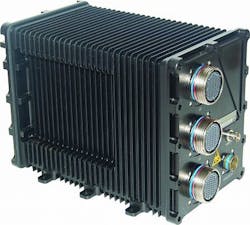THE MIL & AERO COMMENTARY, 22 Nov. 2016. There have been a lot of mergers and acquisitions in the embedded computing industry recently, which makes me wonder, are we in the midst of an embedded computing industry shakeout?
The last week alone involved two embedded computing industry acquisitions, both involving Abaco Systems, the former GE Intelligent Platforms that spun-off as an independent company in December 2015.
On 17 Nov. Abaco leaders announced their acquisition of the Micro Mezzanine System (MMS) line from Technobox Inc. of West Berlin, N.J. Then just yesterday Abaco announced the acquisition of digital signal processing (DSP) specialist 4DSP LLC in Austin, Texas.
These acquisitions are enhancing Abaco's expertise in rapidly configurable embedded computing I/O mezzanine cards, as well as in high-speed DSP and data-acquisition based on field-programmable gate array (FPGA) technology for aerospace, defense, biomedical, communications, and semiconductor applications.
These Abaco deals followed rapidly on the heels of the 2 Nov. news that Mercury Systems in Chelmsford, Mass., is acquiring mission computing and small-form-factor embedded computing specialist CES Creative Electronic Systems S.A. in Grand-Lancy, Switzerland, for $38 million in cash.
This deal boosts Mercury's expertise in safety-critical avionics, which is expected to be a promising market as unmanned aerial vehicles (UAVs) seek to fly in commercial airspace alongside passenger jetliners and cargo aircraft.
Last March Mercury also acquired the embedded security, RF and microwave, and custom microelectronics businesses of Microsemi Corp., which boosted Mercury's expertise in secure data storage, anti-tamper technologies, and RF and microwave designs. Part of that acquisition involved the old White Electronic Designs Corp. in Phoenix.
I suppose the time is right for consolidation in the embedded computing industry -- particularly for companies like Abaco and Mercury that are heavily involved in the aerospace and defense market.
We're at the end of a long down-cycle in aerospace and defense electronics. The past eight years have seen dwindling defense budgets, sequestration, and stagnant leadership in the Pentagon that has involved a hollowing-out of the top echelons of the U.S. military's officer corps.
Related: Worldwide market for military embedded computing to near-double over next five years
I'm surprised, quite frankly, that we haven't seen more military electronics industry consolidation over the past eight years. Perhaps we're seeing an uptick now because some of the smaller companies simply can't hang in any longer.
Times are changing, though. Looking at the military embedded computing industry, one study predicts this market will nearly double over the next five years, which would place companies like Abaco, Mercury, and their head-to-head competitors in good stead during the years to come.
Analysts at market researcher Markets and Markets in Pune, India, predict that worldwide demand for military embedded computing will increase by 89.2 percent over the next five years, from $71.29 billion this year to $134.88 billion by 2021, which represents a combined annual growth rate of 13.6 percent during the forecast period.
Fueling growth in the military embedded systems market over the next five years are multicore processor technology; emergence of modern electronic warfare (EW) and network centric warfare systems; and the increased use of wireless and cloud computing technologies, analysts say.
Related: Board-industry consolidation: haven't we seen this before?
Another piece of news fueling industry optimism is the 8 Nov. election of Donald Trump as president of the United States. Trump is talking about peace through strength, increases in military spending, modernizing the nation's ageing nuclear weapons arsenal, securing critical infrastructure from cyber attacks, and using U.S. military power only to support American national interests.
The stock market is up -- particularly for traditional defense companies like Lockheed Martin and BAE Systems -- and many analysts are looking for better times ahead for the defense industry.
With that, we may see more embedded computing company mergers and acquisitions in the coming weeks, as the large companies seek to get bigger, and the small companies try to keep their heads above water.
I suspect that by this time next year we'll see a fundamentally transformed military embedded computing industry, and a quickly recovering defense electronics industry overall.
Learn more: search the Aerospace & Defense Buyer's Guide for companies, new products, press releases, and videos


